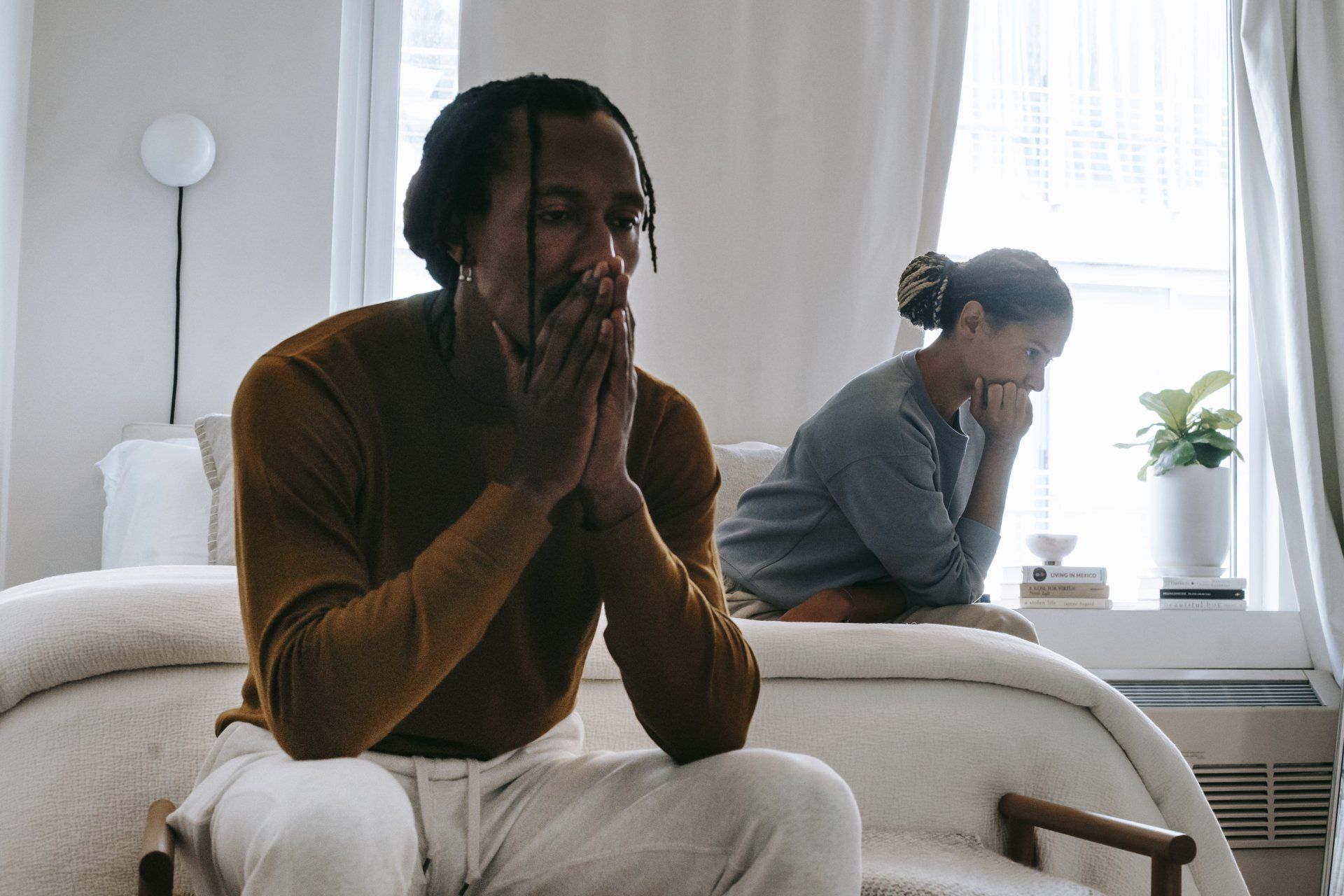By Hande Walker, MA, LLP
•
October 15, 2025
I used to despise people telling me to be grateful or even worse, count my blessings, every time I expressed negative emotions about a problem in my life. I have never found gratitude or positive affirmations helpful, always regarded them as a form of psychobabble— until quite recently learning about "glimmers". To me, glimmers (or any other nervous system regulation technique) are almost the prerequisite to any type of positive thinking, whether it's gratitude exercises or the practice of reframing negative thoughts. Nervous system regulation is the ability to go back and forth between states of activation/arousal (when you are triggered) and states of calm/relaxed, depending on what’s going on in your environment. This is the natural capacity of your nervous system, to be functioning smoothly and finding balance between different states; for your heart rate to increase for instance to prepare for action, and then to slow down and recover from the aftereffects of this activation. When you experience traumatic events, your nervous system gets stuck in different states for too long. Constantly being in a state of hyper-arousal is an example of this. Waiting for the next thing to go wrong, you are always hyper vigilant, on guard, and prepared. Slowing down feels risky and unsafe. Fortunately, there are ways in which you can teach your nervous system find balance and reclaim a peaceful state for optimal rest. For me, my nervous system needs to get to a state of calm and some sense of grounded-ness before I can convince my brain to think positive. Thinking positively feels like a tall order when my system is still trying to assess danger for survival. Glimmers are more accessible to me in such a state of hyper-arousal, while gratitude feels like extra work and effort when I am already at capacity. I suppose I also did not quite understand the point of positive thinking in the past, which contributed to my aversion. To say—let alone believe—that I was a worthwhile human being deserving of wonderful things did not quite match the internal storm I harbored, for instance, when I was in the depths of despair trying to make sense of the ending of my marriage a few years ago. So, neither positive affirmations nor gratitude exercises alone was enough to shift my thinking. I am using past tense because I have a different, more accepting, softened, curious, not so ready to attack type of attitude towards positive thinking, specifically gratitude and positive affirmations, maybe even leaning more towards positive, but when it's done in the right way, in combination with nervous system regulation. I am mostly frustrated with the expectation that we are to be grateful in life. I do think that when something unfortunate happens, it is very normal to acknowledge the badness in the situation rather than finding the silver-lining. Contrary to some widely used social scripts, I do not believe that everything happens for a reason or that there is a life lesson we can learn from every negative experience. If that happens naturally, that's wonderful. However, I believe that sometimes this mentality forces us to turn our emotions into something productive, to make something good with the misfortunate we have experienced. I get that this may be a source of comfort that distracts people from experiencing their excruciating pain. Some people think that the opposite of finding the silver lining is dwelling or staying stuck. I think this brings up a lot of fear about losing control and not being able to stop the pain once acknowledged, seen, and felt. Although this fear is valid, you can always learn healthy ways to cope with a bad situation, instead of trying to convince yourself that your situation is “not that bad”. Fully processing your feelings and thoughts about distressing life events and integrating these experiences into your life can help you develop a more adaptive narrative about yourself and the traumatic event you endured. On the other hand, if you are conditioned to be a Pollyanna, you may trick yourself into believing that bad things happen to teach you something valuable in life. I want to recognize that it can feel more empowering and less helpless to think that ‘everything happens for a reason’ than to accept that bad things happen, period. It is also understandable and human to want to avoid the pain and suffering, but this avoidance can be costly. It is possible to build up internal resources and a good support system, while expanding our capacity to tolerate distress and navigate the after-effects of trauma. So that you do not have to invalidate or diminish the significance of your own feelings/experiences and so that you can start living from your highest potential, liberated from all of the limitations imposed by the unaddressed overwhelming life experiences. To be clear, I do think that if you are able to make something productive out of your trauma or if it becomes the driving force of you making your life more meaningful, then that is very powerful. A common example is people experiencing domestic violence and becoming an advocate to raise awareness in the pursuit of helping others. It can be healing for them and for the survivors of violence. But sometimes bad things happen, and you can't make sense of it, you do not have the answers as to why they happened, or you don't have the motivation or willingness to transform your misfortune into an opportunity like some people are able to do. I find that desperately trying to find answers takes us away from the experience of feeling the pain and ultimately impedes our ability to move on from it. Oftentimes, the act of mourning may bring us closer to the acceptance and meaning making stage anyway. Paradoxically, I find that the truth or the wisdom we so often search for—through the pursuit of definitive/fixed answers—actually lies in the discomfort of existing in that in-between-space, in the not knowing, the ambiguity, the uncertainty, and the doubt. My hypersensitivity to positive thinking probably stems from my very first encounter with the concept of gratitude by my very-well-intentioned, sweet mother, suggesting to me that the blemishes on my skin were a symbol of my youth, something to be cherished and even celebrated when I was in middle school. I did not quite feel like celebrating or cherishing my blemishes at that time of my life—I do not think I will ever get there to be honest. I know what my mother was trying to accomplish and I love her for that. However, her attempts at instilling positivity inevitably had a role in me developing some sense of guilt and shame around not liking my not-very-likable skin condition at the time, which I carried with me (the guilt and shame) for a long time. It makes me think about how many parents unintentionally plant the seeds of that very unnecessary guilt in their children in an attempt to help their kids feel better about their difficult experiences. When in fact, validation, empathy, and a container to hold all of the distressing emotions would make it a lot easier to deal with unfortunate situations, in my opinion. There was nothing to be grateful for having a skin condition that made me very self conscious at such a difficult developmental phase of my life. I did not want to hear that I was beautiful even with the presence of my skin condition (a form of positive affirmation) because I did not believe it. I also did not want to hear that my skin condition symbolized something meaningful like me going through puberty and being an otherwise healthy adolescent (a form of gratitude). NO, it symbolized unfairness and a sense of defeat to me. I was doing a 12-step skin care routine and staying away from gluten and dairy (even before it was trendy) when I was still a young girl, whereas my friends could just be 'regular teens' and not care about their diet/skin care regimen. As an adult, I am aware that my friend's lives were probably not perfect either, but I did not have the biological and emotional capacity in middle school to think rationally and say "Well I am sure everyone is going through something, nobody has it all". I was convinced that I was doomed. So my point is that, I was not really receptive to the positive affirmations or the gratitude practices at that age. The younger part of me just wanted to complain and cry and for my adults to be on my side and not only give me permission to cry, protest, complain, and grieve, but also give me tools (in addition to the practical help and resources) to manage these very difficult feelings, because that would have been the best gift ever. Even writing this, a part within me is screaming at me to be 'grateful' for my health, to be grateful for my wonderful childhood, my amazing parents' endless support, countless appointments with numerous dermatologists, for all the medication that I could afford to buy, my parents' active involvement in my life, and their genuine love and care for me. And I am forever grateful. AND, I would also greatly benefit from validation and a toolkit (perhaps glimmers) to help me make sense and cope with my feelings of despair, instead of being rushed into the stage of acceptance through gratitude. Anyway, this blog post was supposed to be about the Polyvagal Theory and how it served as a precursor to somehow transforming my thoughts about gratitude and affirmations. Let's move on to the main story, glimmers. It was not that long ago that I heard the term "glimmers". I fell in love with this word (my skeptical part surprisingly did not automatically put this term in the psychobabble category). Somehow, the word itself gave me hope. I started sharing the meaning and value of "glimmers" with my family, friends, and clients. It felt more approachable to me to notice glimmers as a way of cultivating a hopeful and optimistic outlook on life, as opposed to repeating some mantras to myself that did not quite resonate. I am very cautious and skeptical of any intervention or technique that is so trendy and "life changing" as I do not believe in quick, surface level fixes. Understanding the science behind glimmers and its connection to nervous system regulation was profound. If you do not know what a glimmer is already, here is an explanation from Deb Dana: "A glimmer is a micro-moment of regulation that fosters feelings of well- being. A glimmer could be as simple as seeing a friendly face, hearing a soothing sound, or noticing something in the environment that brings a smile...". Deb Dana talks about the positive impact of glimmers on neutralizing triggers and helping us come back to regulation. After attending Deb Dana's training on Polyvagal Theory and getting a better understanding of the biological underpinnings of glimmers, I have started to practice "noticing and naming glimmer moments" as she had suggested in the training. Below you will find a few examples of the types of glimmers I have encountered in the recent months: I was in Chicago recently with my partner exploring the city. We decided to take a break from walking around downtown and sat on a bench at the Cityfront Plaza to take in the beautiful view of the city, skyscrapers, and the hustle and bustle of its busy people. I grew up in a big city in Turkey, so simply being around big buildings was glimmer-ous enough for me. Not for my partner though, he felt mostly claustrophobic being surrounded by enormous buildings. The city life itself was not particularly a source of glimmer for him, which is a testament to the uniqueness of everyone's personal glimmer. Your glimmer can very well be someone else's trigger, but when you find a glimmer moment that you can share with a loved one, it can be a real special moment in my opinion. Shortly after our quiet break in the Cityfront Plaza, we managed to find a mutual glimmer totally unexpected. We were suddenly made aware of the theatrical arrival of the sassiest Canadian goose I have ever seen in my life. Somehow, this bird managed to be the center of attention with its loud entrance to the scene, fluttering its wings as if to call attention as a display of dominance, as if to say "Everyone, look how magnificent I am", with all sorts of tricks and shows proud with the attention it was getting from all of the tourists, but to be honest—mostly me. I could not keep my eyes off of it. I was captivated. I think that was the most peaceful I have felt in a long time. It felt like all of my body parts were at rest simultaneously for the first time, there was no urgency to move or do anything else, but to stay in that moment. I felt content, grounded, and as if all the pieces were in the right place. Needless to say, the Canadian goose was my glimmer. And if I were to make a list of glimmers before this experience, I do not know that a goose would make the top of the list. Another recent glimmer was watching a squirrel eat what seemed to be a gigantic apple outside of the window of my dentist's office, instantly calming my nerves whilst sitting in my dentist's chair anxiously waiting for her to arrive. Another example was raindrops hitting my window, leaving visible streaks and patterns of water on the glass. A glimmer I notice on a daily basis is the post snack lip smacking of my cat. It is the most soothing and comforting sound ever. I find that my glimmers have a common theme—animals and nature. I realized that it has been very powerful for me to be mindful of these glimmers that I notice each day, as they remind me of the bigger picture, my purpose and meaning, what I value and live for (a goose?), and indirectly and effortlessly, make me more grateful for and remind me of all the wonderful things that I have in my life. The irony in all of this is that I do not have to force the positive affirmations down my throat when my body does not tolerate and reacts negatively to this foreign substance it does not recognize and therefore does not digest. After all, it was easier for me to come to the conclusion that I was a worthwhile being when my nervous system was in a regulated state. Unexpectedly, the glimmers set the necessary conditions right, so that I was more receptive to engaging in a higher level cognitive exercise (reframing negative thoughts, making a gratitude list, etc) that ultimately allowed me to be at peace with myself and the world. Ultimately, I am 'grateful' for all of my glimmers and how easily accessible they are in everyday life. How wonderful would life be if we were all offered the exact tools we needed to thrive and be our best selves in childhood. At the risk of sounding like an inspirational quote, it is never too late to re-parent yourself and give yourself the proper nutrition you need to cope with a stressful situation, rather than constantly feeling defeated and even more guilty when you can not take in all the "support and comfort" the wonderful people in your life are so genuinely and generously offering. I hope you are surrounded by people who can listen to you and adapt/ adjust their valuable offerings so that their support matches your internal storm, and will not end up causing a hurricane when all they are attempting to give you is a safe haven. I hope with the help of "glimmers", you can also identify what your safe haven is, so you know exactly where to take refuge during challenging times. If you need the help of a professional to help you identify the coping tools specifically designed for your unique needs, sensitivities, and personality patterns, do not hesitate to reach out to Restore to schedule an appointment with a Restore therapist. A few side notes: If positive affirmations and gratitude exercises/practices are helpful for you, that is wonderful. This post is for individuals who do not find them helpful, who may need adaptations or alternatives to these practices, or may need more ground-work (mindfulness, therapy, etc) to do before they can use them as valuable resources. If you find the information on gratitude and positive affirmations on any social media platforms helpful, validating, affirming, that is great. My hope is that you are mindful of the content you are consuming, as there is a lot of toxic positivity and inaccurate information being shared by individuals that are not trained in mental health. Although they may mean well, some of the information they share can be more harmful for some individuals or vulnerable populations. If something resonates with you, that's great. If not, discerning media content can be a skill you can cultivate in order to protect your mental/emotional wellbeing. Hande Walker, MA, LLP is a therapist at Restore Therapy Collective. In her free time Hande enjoys long walks or a hike in the nature. Besides spending time with friends and family, Hande loves reading-especially psychological thriller books. To schedule an appointment with Hande, please send a secure message through our contact form .




